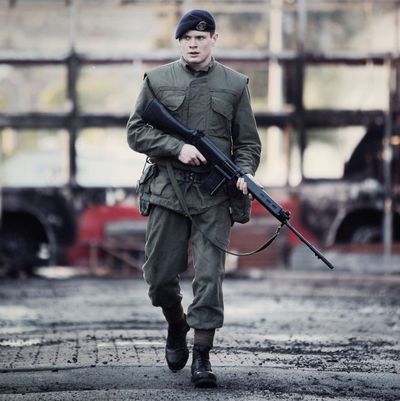
In the last three films IÔÇÖve seen him in, Jack OÔÇÖConnell has physically suffered so much onscreen that I think heÔÇÖs accidentally atoned for humanityÔÇÖs sins. The 25-year-old actor, who ably held together Angelina JolieÔÇÖs WWII epic Unbroken and David MackenzieÔÇÖs intense prison drama Starred Up, is now at the center of Yann DemangeÔÇÖs brutal ÔÇÖ71, and once again he experiences the tortures of the damned. Luckily, heÔÇÖs riveting in the role: The film, about a novice British soldier cut off from his unit during a riot in Belfast, is less about words and more about the varieties of terror in a young manÔÇÖs eyes.
ÔÇÖ71 starts off in a procedural vein, as we watch Gary Hook (OÔÇÖConnell) and his fellow soldiers (most of whom look like teenagers) in training ÔÇö boxing, running, combat drills ÔÇö before learning that theyÔÇÖre being deployed to Belfast. ItÔÇÖs the height of the Troubles, and this is, as the saying goes, the shit. ÔÇ£I trust you all know where Belfast is,ÔÇØ a commanding officer bellows at them. ÔÇ£Northern Ireland. The United Kingdom. Here. You are not leaving this country!ÔÇØ He can scream as much as he wants, but his exhortation is still as much a wish as it is a fact. ÔÇ£These are the front lines, boys,ÔÇØ Gary and the others are later told. ÔÇ£Catholics and Protestants living side by side, at each otherÔÇÖs throats.ÔÇØ
Not long after arrival, the troop is sent into town for what appears to be a routine house search. (ÔÇ£Berets. No riot gear. We need to reassure people.ÔÇØ) But what they find is closer to what one might see now in Iraq or Palestine. TheyÔÇÖre met with kids flinging bags of shit and piss, women banging trashcan lids, and everyone else throwing rocks. Bodies start to drop, the soldiers pull out, and Gary finds himself effectively behind enemy lines ÔÇö separated from the other soldiers, on his own in streets filled with people who want him dead.
ItÔÇÖs at that point that ÔÇÖ71 starts to become a different movie ÔÇö less an observant narrative of chaos and resistance and more an absurdist thriller. Gary hides out from his pursuers and is helped to varying degrees by a cross-section of people ÔÇö as if Black Hawk Down had morphed into After Hours. (One might also be reminded at times of Carol ReedÔÇÖs classic IRA thriller Odd Man Out.) As night settles, various factions and underground organizations set out to find Gary; some want to kill him, some to use him. ThereÔÇÖs a tonal dissonance here: The gangster-movie dialogue of these different groups, as well as a somewhat lame late movie shoot-out, feel far removed from the terse, beautifully choreographed pandemonium of the filmÔÇÖs first act.
But whenever the film focuses on Gary, itÔÇÖs OÔÇÖConnellÔÇÖs show. And the actorÔÇÖs ability to quietly express a whole range of emotions with his body language and his eyes, is staggering ÔÇö especially since, for much of the film, heÔÇÖs limping and covered in blood. We sense his helplessness, and his youth, which in turn echoes the youth of some of the people chasing after him. Thus, our concern for this young man anchors the more pointed drama swirling around him. As GaryÔÇÖs fate becomes a political bargaining chip between these different sides and factions, Demange lays out the absolute clusterfuck of betrayal and suspicion that characterized the Irish struggle. We see how the army was at the mercy of on-the-ground operatives, how terrorism and murder were semi-legitimized, how the young were sacrificed by the old, and how morality and humanity took a backseat to political expedience on both sides. ÔÇÖ71 doesnÔÇÖt always work, but when it does, itÔÇÖs a blistering, gripping tale of a boy lost in a war gone horribly wrong.


